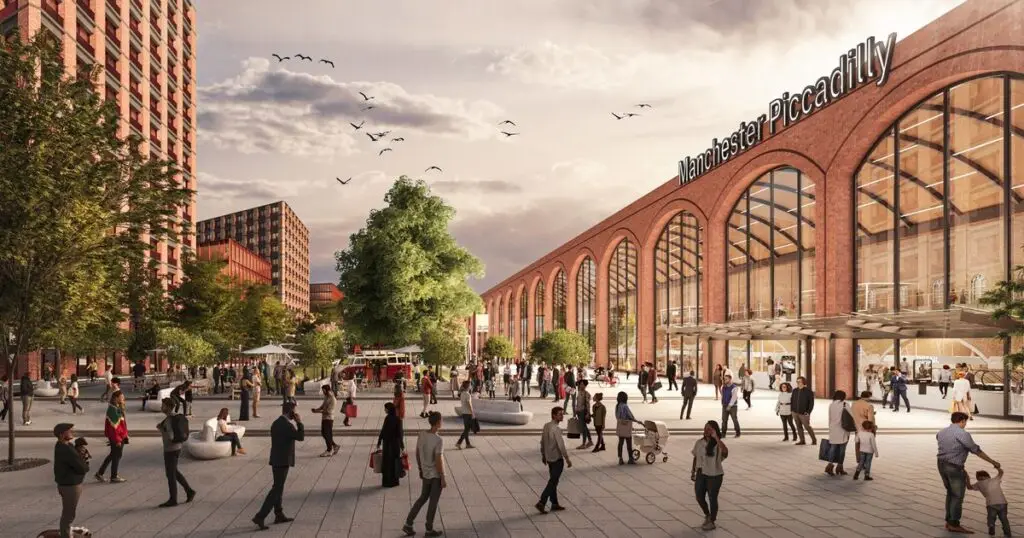In a recent development, Andy Burnham, the Mayor of Greater Manchester, highlighted the dependency of a new railway line between Manchester and Liverpool on government funding. Just hours prior, Transport Secretary Lou Haigh announced that the necessary funds were not available.
The proposal for the Manchester-Liverpool railway was initiated in May, with Burnham and Liverpool’s Mayor, Steve Rotheram, earmarking £17 billion for its construction. This ambitious project aims to enhance connectivity in Northern England, but its realisation now hangs in the balance due to potential funding cuts.
Background of the Proposed Railway Line
The proposed railway line between Manchester and Liverpool has been a major focus for regional leaders, underpinned by a commitment of £12 billion reallocated from the HS2 project and an additional £5 billion intended for Liverpool Central station’s redevelopment. The project emerged as a strategic initiative to boost regional connectivity and economic growth in Northern England.
The initiative was officially launched in May by Andy Burnham and Steve Rotheram, symbolising a significant collaboration between Manchester and Liverpool. However, the financial viability of this ambitious project is fundamentally tied to government funding, making the recent announcement by Transport Secretary Lou Haigh particularly concerning.
Government’s Position on Funding
Transport Secretary Lou Haigh communicated on September 23 that the previous Conservative government had not finalised an agreement with the Treasury regarding the funding for the Manchester-Liverpool railway. She emphasised the importance of the project but acknowledged that the necessary funds were not ‘practically available’ at present.
In her statement, Haigh highlighted the need for a comprehensive long-term infrastructure strategy that supports nationwide growth rather than selectively benefiting certain constituencies. This strategic overview is intended to ensure equitable development across the country, balancing regional needs and available resources.
Response from Andy Burnham
At a press conference, Andy Burnham responded to the funding concerns by insisting that he had not received any formal communication indicating the withdrawal of the promised £17 billion. He stated, ‘The only indication I have had is that £12B was ring fenced from the government after the HS2 decision last year, and there’s been no announcement to the contrary.’
Burnham underscored his approach of relying on official notifications over media statements. He further stressed the importance of the promised funds by saying, ‘We would need that £17B. That’s what we’ve been promised. I’ve had no indication that it’s not there to be used.’
Importance of the Railway Line
The Manchester-Liverpool railway line is not just a transportation project; it’s envisioned as a catalyst for economic development in Northern England. The successful completion of this project promises enhanced connectivity, reduced travel times, and significant economic benefits for the region.
Additionally, the project is expected to alleviate congestion on existing transport networks, thus contributing to more efficient and sustainable urban mobility. The railway line is seen as integral to the broader Northern Powerhouse initiative, aimed at rebalancing the UK’s economic landscape.
Collaboration with the Private Sector
In light of the funding uncertainty, Burnham introduced Huw Merriman, former Conservative railway minister, as the new chair of the Liverpool-Manchester railway partnership board. This board is designed to facilitate collaboration with the private sector, potentially unlocking additional funding and resources for the project.
The involvement of private sector stakeholders is seen as a strategic move to diversify the project’s financial base and reduce dependency on government funding alone. This partnership aims to leverage private sector expertise and investment to advance the railway line’s development further.
Lou Haigh’s Strategic Vision
Transport Secretary Lou Haigh’s call for a nationwide infrastructure strategy reflects a broader vision of inclusive growth and development. By taking a step back and reviewing all potential projects, the government aims to prioritise initiatives that deliver maximum benefits across regions.
This strategic approach means that while the Manchester-Liverpool railway is undoubtedly important, it must be considered alongside other critical infrastructure projects. The government’s goal is to ensure that resource allocation is coordinated and that investments drive comprehensive national growth.
Future Prospects
The future of the Manchester-Liverpool railway project remains uncertain amidst funding challenges. However, the commitment of regional leaders like Andy Burnham and Steve Rotheram, along with potential private sector collaborations, keeps hope alive for the project’s realisation.
Going forward, it will be crucial for all stakeholders to engage in constructive dialogue and explore innovative funding mechanisms. The ultimate goal remains clear: to enhance Northern England’s connectivity and drive its economic resurgence through this vital infrastructure project.
The Manchester-Liverpool railway project faces significant funding hurdles, but regional leaders remain committed to its completion. Collaboration with the private sector and strategic government planning will be key in overcoming these challenges.
The project’s success is vital for the economic and social development of Northern England, making it imperative for all parties involved to find viable solutions and ensure its fruition.

